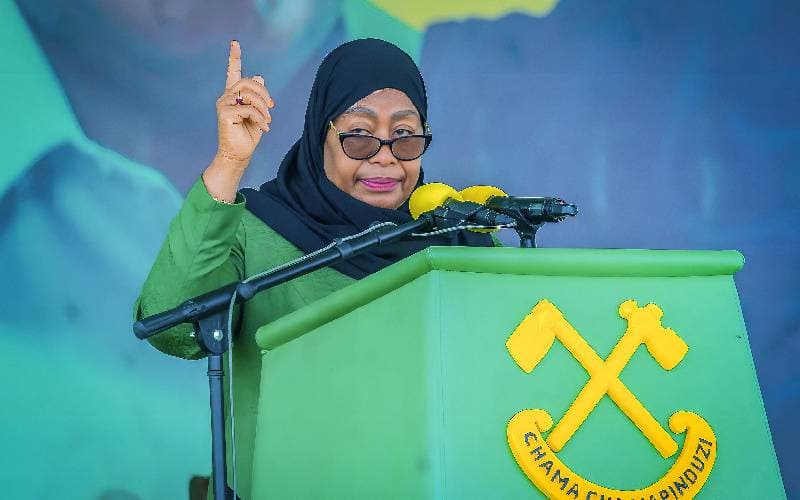We're loading the full news article for you. This includes the article content, images, author information, and related articles.
Once hailed as a democratic reformer, Tanzanian President Samia Suluhu Hassan's recent crackdown during the October 2025 elections has triggered deadly protests and raised alarms across East Africa, prompting questions about regional stability and democratic backsliding.

When Samia Suluhu Hassan ascended to the presidency in March 2021 following the death of John Magufuli, a wave of optimism swept across Tanzania and the East African region. Initially, her administration signaled a significant departure from her predecessor's notoriously authoritarian rule. President Suluhu's government lifted bans on media outlets, allowed opposition rallies to resume for the first time since 2016, and engaged in dialogue with political opponents, championing a mantra of "Reconciliation, Resilience, Reform, and Rebuilding." This approach earned her international praise and kindled hopes for a new democratic era in Tanzania.
However, the period leading up to and during the Wednesday, 29 October 2025 general elections has starkly contradicted this early promise. Her government has been accused of orchestrating a systematic crackdown on dissent, culminating in an election marred by the disqualification of major opposition candidates, widespread protests, and significant violence. This dramatic shift has transformed her image from that of a cautious reformer to an agent of fear, leaving many to question the trajectory of one of East Africa's key nations.
The recent electoral process has been the focal point of the nation's turmoil. President Suluhu, seeking her first full term, ran virtually unopposed after her main challengers were barred from the ballot. Tundu Lissu, the leader of the main opposition party, Chadema, was arrested in April 2025 and put on trial for treason, a non-bailable offense that kept him imprisoned throughout the election period. Luhaga Mpina, the presidential candidate for the second-largest opposition party, ACT-Wazalendo, was also disqualified.
These actions, viewed by critics as a deliberate move to eliminate competition, triggered massive protests in major cities including Dar es Salaam, Mwanza, and Arusha, beginning on election day. Demonstrators have demanded the annulment of the polls, leading to violent clashes with security forces. The government responded by imposing an internet blackout and a curfew in Dar es Salaam, with the military deployed to enforce it. Reports on casualties vary significantly. The United Nations confirmed at least 10 deaths, while Amnesty International cited reports of at least 100 fatalities. The main opposition party, Chadema, has claimed that as many as 700 people have been killed in the three days of unrest following the vote. The government has largely remained silent on the violence, with the army chief labeling the protesters as "criminals."
The election-related crackdown is not an isolated event but the culmination of a worrying trend of repression that has intensified over the past two years. Human rights organizations have documented a disturbing pattern of enforced disappearances, arbitrary arrests, and extrajudicial killings targeting government critics, opposition members, and journalists. Amnesty International's October 2025 report, titled "Unopposed, Unchecked, Unjust," detailed a "wave of terror" and accused authorities of using repressive laws to silence dissent. Even critics from within the ruling Chama Cha Mapinduzi (CCM) party, such as Humphrey Polepole, have been victims of abduction.
This slide towards authoritarianism has dismantled the initial hopes for reform. While President Suluhu's early tenure saw positive economic developments, with foreign direct investment increasing significantly, the recent political instability threatens to undermine these gains. Her administration had actively courted foreign investors, positioning Tanzania as a stable and attractive business destination in East Africa.
The unfolding crisis in Tanzania has significant implications for Kenya and the wider East African Community (EAC). The two nations are major trading partners, and instability in Tanzania could disrupt regional commerce and supply chains. Tensions have already flared at the border town of Namanga, where clashes resulted in the deaths of at least two Tanzanians. In response, Kenyan authorities, under the direction of President William Ruto, have deployed officers and closed key border crossings to prevent the spillover of protests.
President Ruto, who is also the current chair of the EAC, is in a delicate diplomatic position. He has reportedly been in communication with President Suluhu, and both he and Ugandan President Yoweri Museveni have assured her of their support in managing the crisis. However, the EAC has been criticized for its silence on the erosion of democracy within a member state. The bloc dispatched an election observation mission, but critics argue these missions often fail to address serious electoral misconduct. The situation is further complicated by recent trade disputes, including a Tanzanian directive in July 2025 that banned foreigners from operating in 15 strategic sectors, a move that heavily impacted Kenyan businesses and workers.
As the situation in Tanzania remains volatile, the international community and regional bodies like the EAC are under pressure to respond. The crisis serves as a stark reminder of the fragility of democratic gains and poses a critical test for regional leadership and stability. The path President Suluhu chooses next will not only determine the future of Tanzania but will also reverberate across the entire East African region.
Keep the conversation in one place—threads here stay linked to the story and in the forums.
Sign in to start a discussion
Start a conversation about this story and keep it linked here.
Other hot threads
E-sports and Gaming Community in Kenya
Active 9 months ago
The Role of Technology in Modern Agriculture (AgriTech)
Active 9 months ago
Popular Recreational Activities Across Counties
Active 9 months ago
Investing in Youth Sports Development Programs
Active 9 months ago
Key figures and persons of interest featured in this article